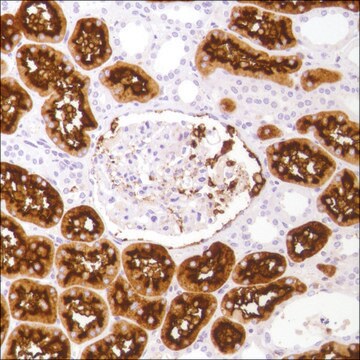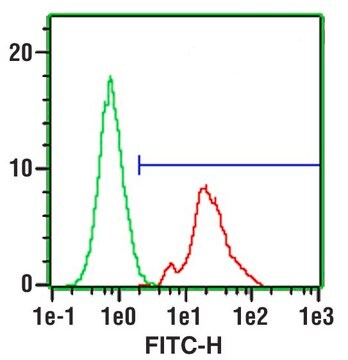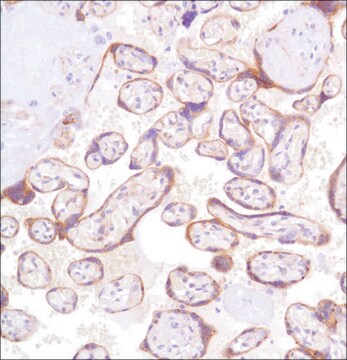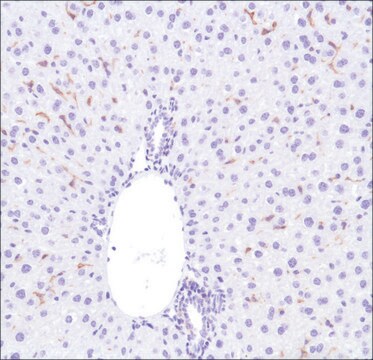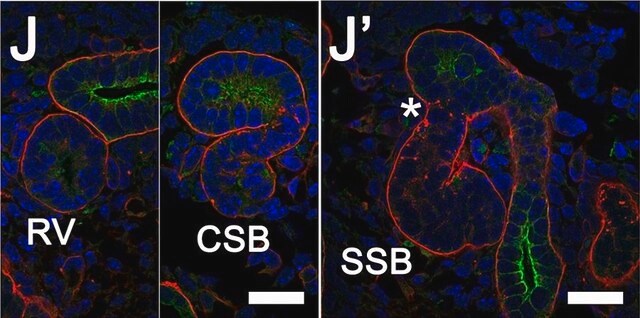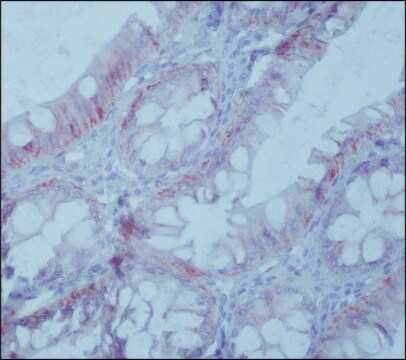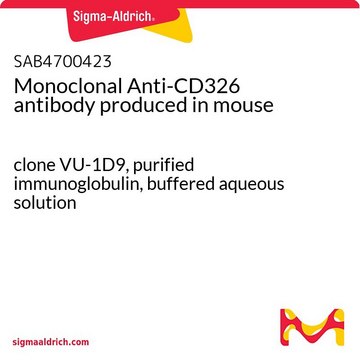SAB4700424
Monoclonal Anti-CD326-FITC antibody produced in mouse
clone VU-1D9, purified immunoglobulin, buffered aqueous solution
Sinonimo/i:
Anti-EPCAM
Autenticatiper visualizzare i prezzi riservati alla tua organizzazione & contrattuali
About This Item
Codice UNSPSC:
12352203
NACRES:
NA.44
Prodotti consigliati
Origine biologica
mouse
Livello qualitativo
Coniugato
FITC conjugate
Forma dell’anticorpo
purified immunoglobulin
Tipo di anticorpo
primary antibodies
Clone
VU-1D9, monoclonal
Stato
buffered aqueous solution
Reattività contro le specie
human
tecniche
flow cytometry: suitable
Isotipo
IgG1
N° accesso NCBI
N° accesso UniProt
Condizioni di spedizione
wet ice
Temperatura di conservazione
2-8°C
modifica post-traduzionali bersaglio
unmodified
Informazioni sul gene
human ... EPCAM(4072)
Descrizione generale
Epithelial cell adhesion molecule (EpCAM) or cluster of differentiation 326 (CD326), is encoded by the 14kb GA733-2 gene mapped to human chromosome 2p21. Human CD326 expression is restricted to epithelia of colon, small intestine, lung, kidney, thymus, liver, pancreas, stomach. It is also expressed in several cancers, progenitor and stem cells. CD326 is a transmembrane glycoprotein characterized with an ectodomain, one transmembrane domain and a 26 residual cytoplasmic domain.
The mouse monoclonal antibody VU-1D9 recognizes an epitope within EGF-like domain I of CD326 / EpCAM, a marker of epithelial lineages. This antibody strongly stains various normal epithelial cells and carcinomas.
Immunogeno
Small cell lung carcinoma cell line H69
Applicazioni
The reagent is designed for Flow Cytometry analysis of human blood cells using 20 μL reagent / 100 μL of whole blood or 1e6 cells in a suspension. The content of a vial (2 mL) is sufficient for 100 tests.
Azioni biochim/fisiol
Cluster of differentiation 326 (CD326) is a transmembrane glycoprotein, involved in several cellular functions, such as epithelial-specific intercellular cell–adhesion, cell signaling, migration, proliferation and differentiation. CD326 is a dominant surface antigen mapped on human colon carcinoma. It has potential as a diagnostic marker for several carcinomas, including epithelial ovarian cancer (EOC). CD326 is considered to be a potential target for cancer treatment. CD326 with the help of components of wnt signal transduction pathway plays a vital role in stem cell signaling.
Caratteristiche e vantaggi
Evaluate our antibodies with complete peace of mind. If the antibody does not perform in your application, we will issue a full credit or replacement antibody. Learn more.
Stato fisico
Solution in phosphate buffered saline containing 15 mM sodium azide and 0.2% high-grade protease free BSA as a stabilizing agent.
Esclusione di responsabilità
Unless otherwise stated in our catalog or other company documentation accompanying the product(s), our products are intended for research use only and are not to be used for any other purpose, which includes but is not limited to, unauthorized commercial uses, in vitro diagnostic uses, ex vivo or in vivo therapeutic uses or any type of consumption or application to humans or animals.
Non trovi il prodotto giusto?
Prova il nostro Motore di ricerca dei prodotti.
Codice della classe di stoccaggio
10 - Combustible liquids
Classe di pericolosità dell'acqua (WGK)
WGK 2
Punto d’infiammabilità (°F)
Not applicable
Punto d’infiammabilità (°C)
Not applicable
Scegli una delle versioni più recenti:
Possiedi già questo prodotto?
I documenti relativi ai prodotti acquistati recentemente sono disponibili nell’Archivio dei documenti.
Epithelial cell adhesion molecule expression (CD326) in cancer: a short review.
Patriarca C
Cancer Treatment Reviews, 38, 68-75 (2012)
Gilbert Spizzo et al.
Gynecologic oncology, 103(2), 483-488 (2006-05-09)
Currently available clinical and molecular factors provide still an insufficient prognostic and predictive assessment for patients with epithelial ovarian cancer (EOC). To identify a potential molecular target and prognostic/predictive factor for EOC, we investigated in a retrospective study the prognostic
Graham Carpenter et al.
Cancer cell, 15(3), 165-166 (2009-03-03)
The epithelial-specific cell adhesion molecule (EpCAM) modulates cell adhesion and proliferation. Its overexpression correlates with tumor cell proliferation, and EpCAM is a therapeutic target. In the February issue of Nature Cell Biology, Maetzel et al. demonstrate that proliferative responses to
Monika Trzpis et al.
Transgenic research, 17(2), 229-238 (2007-10-18)
The Epithelial Cell Adhesion Molecule (EpCAM) is expressed virtually on normal epithelia in vertebrates. Among different species, the amino acid sequence of EpCAM is highly homologous, indicating that EpCAM is an evolutionary conserved protein. However, differences in the expression pattern
A Brunner et al.
Journal of clinical pathology, 61(3), 307-310 (2007-06-26)
EpCAM is an adhesion molecule of the basolateral membranes in a variety of epithelial cells. Over-expression has been detected in many epithelial tumours and has been associated with high stage, high grade and a worse survival in some tumour types.
Il team dei nostri ricercatori vanta grande esperienza in tutte le aree della ricerca quali Life Science, scienza dei materiali, sintesi chimica, cromatografia, discipline analitiche, ecc..
Contatta l'Assistenza Tecnica.